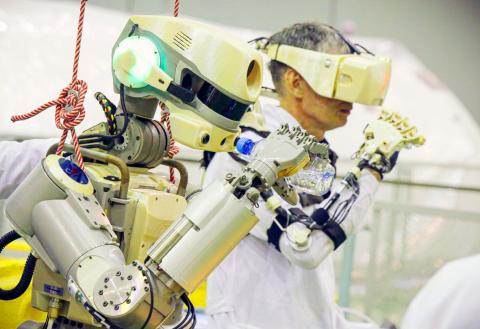Russia yesterday launched an uncrewed rocket carrying a life-size humanoid robot that is to spend 10 days learning to assist astronauts on the International Space Station.
Named Fedor, for Final Experimental Demonstration Object Research, with identification number Skybot F850, the robot is the first ever sent up by Russia.
Fedor blasted off in a Soyuz MS-14 spacecraft at 6:38am from Russia’s Baikonur cosmodrome in Kazakhstan. The Soyuz is to dock with the space station tomorrow and stay until Sept. 7.

Photo: AFP / ROSCOSMOS / Space Center Yuzhny / TsENKI
Soyuz ships are normally crewed on such trips, but no humans are traveling this time to test a new emergency rescue system.
Instead of cosmonauts, Fedor was strapped into a specially adapted pilot’s seat with a small Russian flag in his hand.
“Let’s go. Let’s go,” the robot was heard as “saying” during launch, apparently repeating the famous phrase by first man in space, Yury Gagarin.
The 1.8m silvery robot weighs 160kg.
Fedor has Instagram and Twitter accounts that describe it as learning new skills, such as opening a bottle of water. In the station, it is to trial those manual skills in low gravity.
“That’s connecting and disconnecting electric cables, using standard items from a screwdriver and a spanner to a fire extinguisher,” Roscosmos State Corp for space activities director for prospective programs and science Alexander Bloshenko said in televised comments ahead of the launch.
“The first stage of in-flight experiments went according to the flight plan,” the robot’s account tweeted after reaching orbit.
Fedor copies human movements, a key skill that allows it to remotely help astronauts or even people on Earth carry out tasks while they are strapped into an exoskeleton.
Such robots would eventually carry out dangerous operations such as space walks, Bloshenko told the RIA Novosti state news agency.
On the Web site of one of the state backers of the project, the Foundation of Advanced Research Projects, Fedor is described as potentially useful on Earth for working in high-radiation environments, demining and tricky rescue missions.
Onboard, the robot is to perform tasks supervised by Russian cosmonaut Alexander Skvortsov, who joined the International Space Station last month, and is to wear an exoskeleton in a series of experiments later this month.
Roscosmos director-general Dmitry Rogozin earlier this month showed photographs of the robot to Russian President Vladimir Putin, saying it would be “an assistant to the crew.”
“In the future we plan that this machine will also help us conquer deep space,” Rogozin said.
Fedor is not the first robot to go into space.
In 2011, NASA sent up Robonaut 2, a humanoid robot developed with General Motors with a similar aim of working in high-risk environments.
It was flown back to Earth last year after experiencing technical problems.

NO EXCUSES: Marcos said his administration was acting on voters’ demands, but an academic said the move was emotionally motivated after a poor midterm showing Philippine President Ferdinand Marcos Jr yesterday sought the resignation of all his Cabinet secretaries, in a move seen as an attempt to reset the political agenda and assert his authority over the second half of his single six-year term. The order came after the president’s allies failed to win a majority of Senate seats contested in the 12 polls on Monday last week, leaving Marcos facing a divided political and legislative landscape that could thwart his attempts to have an ally succeed him in 2028. “He’s talking to the people, trying to salvage whatever political capital he has left. I think it’s

Polish presidential candidates offered different visions of Poland and its relations with Ukraine in a televised debate ahead of next week’s run-off, which remains on a knife-edge. During a head-to-head debate lasting two hours, centrist Warsaw Mayor Rafal Trzaskowski, from Polish Prime Minister Donald Tusk’s governing pro-European coalition, faced the Eurosceptic historian Karol Nawrocki, backed by the right-wing populist Law and Justice party (PiS). The two candidates, who qualified for the second round after coming in the top two places in the first vote on Sunday last week, clashed over Poland’s relations with Ukraine, EU policy and the track records of their

UNSCHEDULED VISIT: ‘It’s a very bulky new neighbor, but it will soon go away,’ said Johan Helberg of the 135m container ship that run aground near his house A man in Norway awoke early on Thursday to discover a huge container ship had run aground a stone’s throw from his fjord-side house — and he had slept through the commotion. For an as-yet unknown reason, the 135m NCL Salten sailed up onto shore just meters from Johan Helberg’s house in a fjord near Trondheim in central Norway. Helberg only discovered the unexpected visitor when a panicked neighbor who had rung his doorbell repeatedly to no avail gave up and called him on the phone. “The doorbell rang at a time of day when I don’t like to open,” Helberg told television

A team of doctors and vets in Pakistan has developed a novel treatment for a pair of elephants with tuberculosis (TB) that involves feeding them at least 400 pills a day. The jumbo effort at the Karachi Safari Park involves administering the tablets — the same as those used to treat TB in humans — hidden inside food ranging from apples and bananas, to Pakistani sweets. The amount of medication is adjusted to account for the weight of the 4,000kg elephants. However, it has taken Madhubala and Malika several weeks to settle into the treatment after spitting out the first few doses they